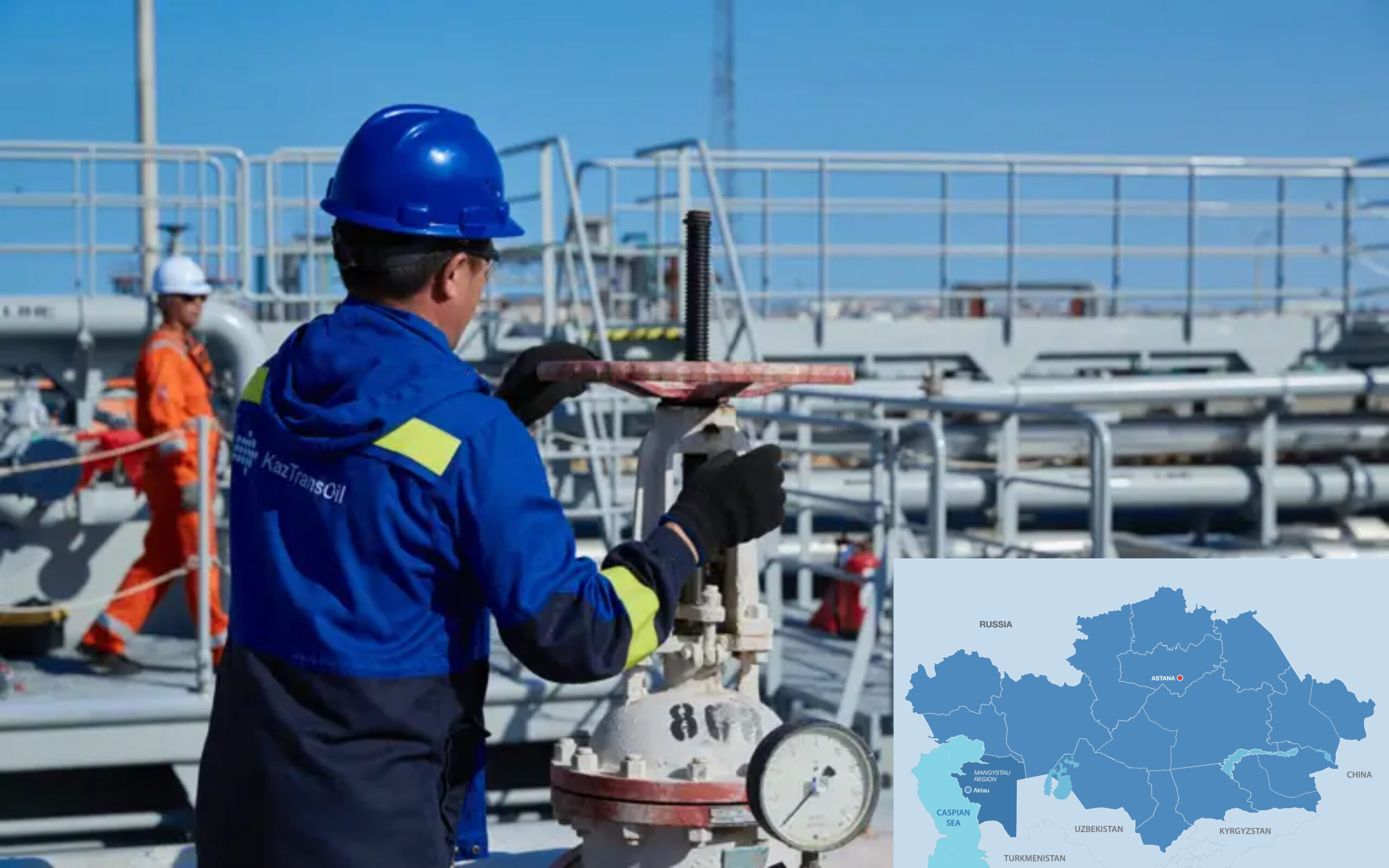ASTANA – KazTransOil, Kazakhstan’s national oil transporter, shipped 490,000 tons of Kazakh oil from the Tengiz field via the Aktau port to the Baku-Tbilisi-Ceyhan pipeline in the first four months of 2024, marking a 356,000-ton increase compared to the same period last year.

KazTransOil’s workers at the Aktau main oil pumping station Photo credit: KazMunaiGaz. Click to see the map in full size. The map is designed by The Astana Times.
In 2023, KazTransOil’s facilities at the Aktau port loaded 3.376 million tons of oil onto tankers, including 1.057 million tons from the Tengiz field destined for Baku ports. By the end of the year, KazTransOil plans to increase shipments to up to 1.5 million tons from the Tengiz field along the same route.
A key facility in the hydrocarbon transportation network is the Aktau main oil pumping station, serving as the starting point for Kazakh oil along the Trans-Caspian International Transport Route. According to Askar Zholdasov, the head of the Mangistau Oil Pipeline Administration at KazTransOil, the station’s history dates back to the 1960s when major fields like Uzen and Zhetybai were discovered.
“For nearly six decades, this pumping station has played a crucial role in transporting raw materials, not only for the domestic market but also in enhancing the country’s export potential,” said Zholdasov.
Initially designed to receive oil from the Uzen and Zhetybai fields via the Uzen-Zhetybai-Aktau pipeline and load tankers, the station now handles various forms of oil transport, including railcar unloading and tanker loading from marine berths.
Currently, the Aktau pumping station boasts a complete technological infrastructure for oil pumping, comprising five pumping stations, advanced energy equipment, and a tank farm with a capacity of 155,000 cubic meters of oil.
Zholdasov underscored the station’s distinctive characteristics, highlighting its role as a centralized hub for various pumping operations. The station provides oil reception and pumping through primary pipelines, unloading from rail tank cars, and loading onto tankers from marine berths.
“The station receives oil from the Buzachi Peninsula fields via the Kalamkas-Karazhanbas-Aktau pipeline. A portion of this oil is transported by sea via the Aktau port to Baku and Makhachkala, while the rest is pumped through the Uzen-Zhetybai-Aktau pipeline via the Zhetybai oil pumping station to the Uzen main oil pumping station. From there, the oil is transported via the Uzen-Atyrau-Samara main hot oil pipeline,” he said.
Additionally, oil is supplied to the bitumen plant, and refined oil is received from the bitumen plant. In 2023, the reception of oil from TengizChevrOil resumed at the railway trestle of the station, enabling oil transportation via the Aktau-Baku route.
“By the end of 2024, we plan to receive up to 1.5 million tons of Tengiz oil and load it into tankers,” said Zholdasov.
Over the past 20 years, the station has undergone significant changes in technological development. Projects for automating production processes have been implemented, including the SCADA system in 2006-2007, ensuring safe and continuous real-time operation.
Kazmortransflot, a subsidiary of KazMunayGas National Company (KMG), has significantly increased tanker voyages, delivering domestic raw materials to Baku and Makhachkala ports.
To develop the Trans-Caspian International Transport Route, KMG and the SOCAR (State Oil Company of Azerbaijan) signed an agreement to transport 1.5 million tons of oil per year from the Tengiz field through the Baku (Azerbaijan) — Tbilisi (Georgia) — Ceyhan (Türkiye) pipeline for the next five years.
The article was originally published in Kazinform.
